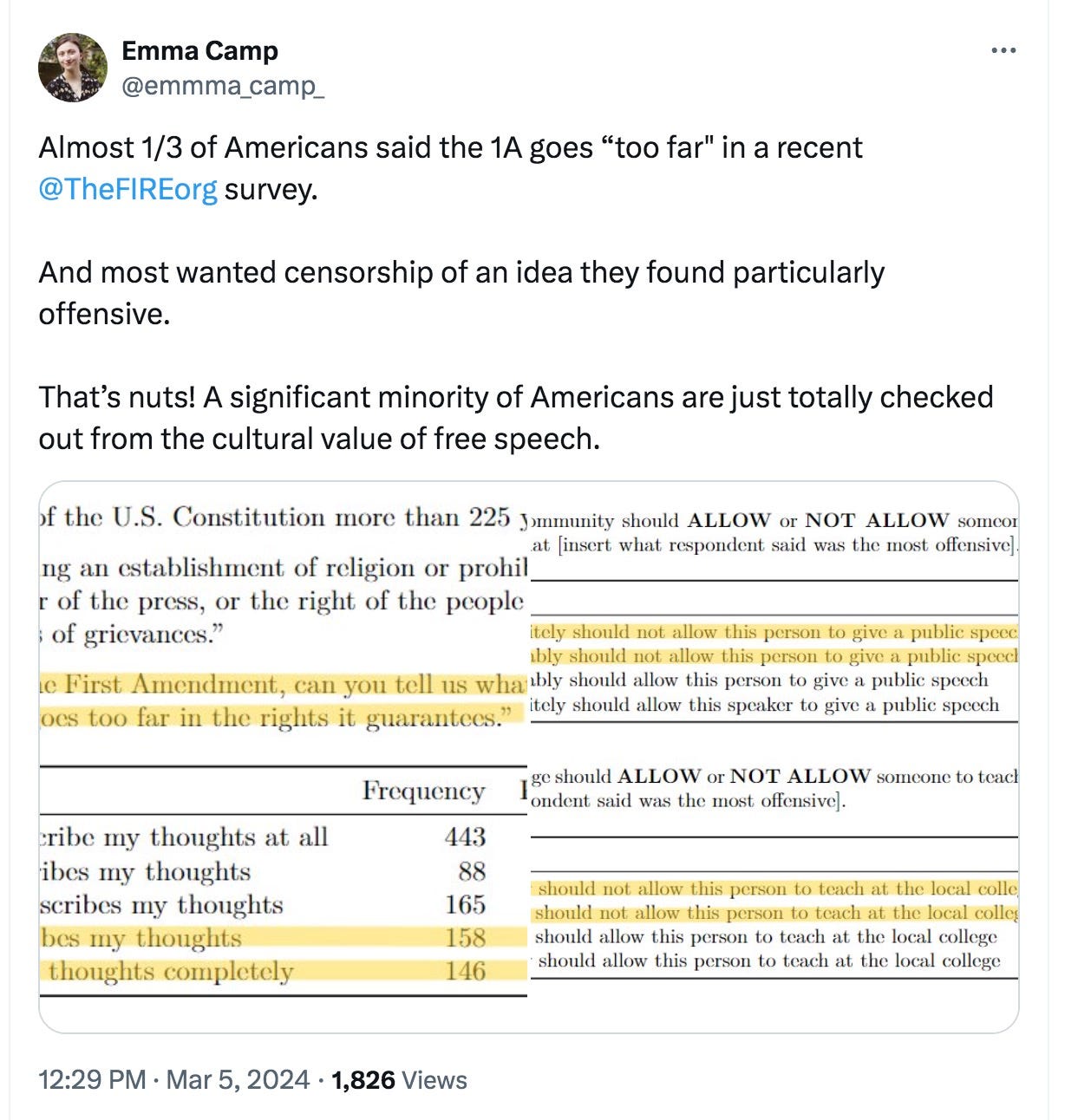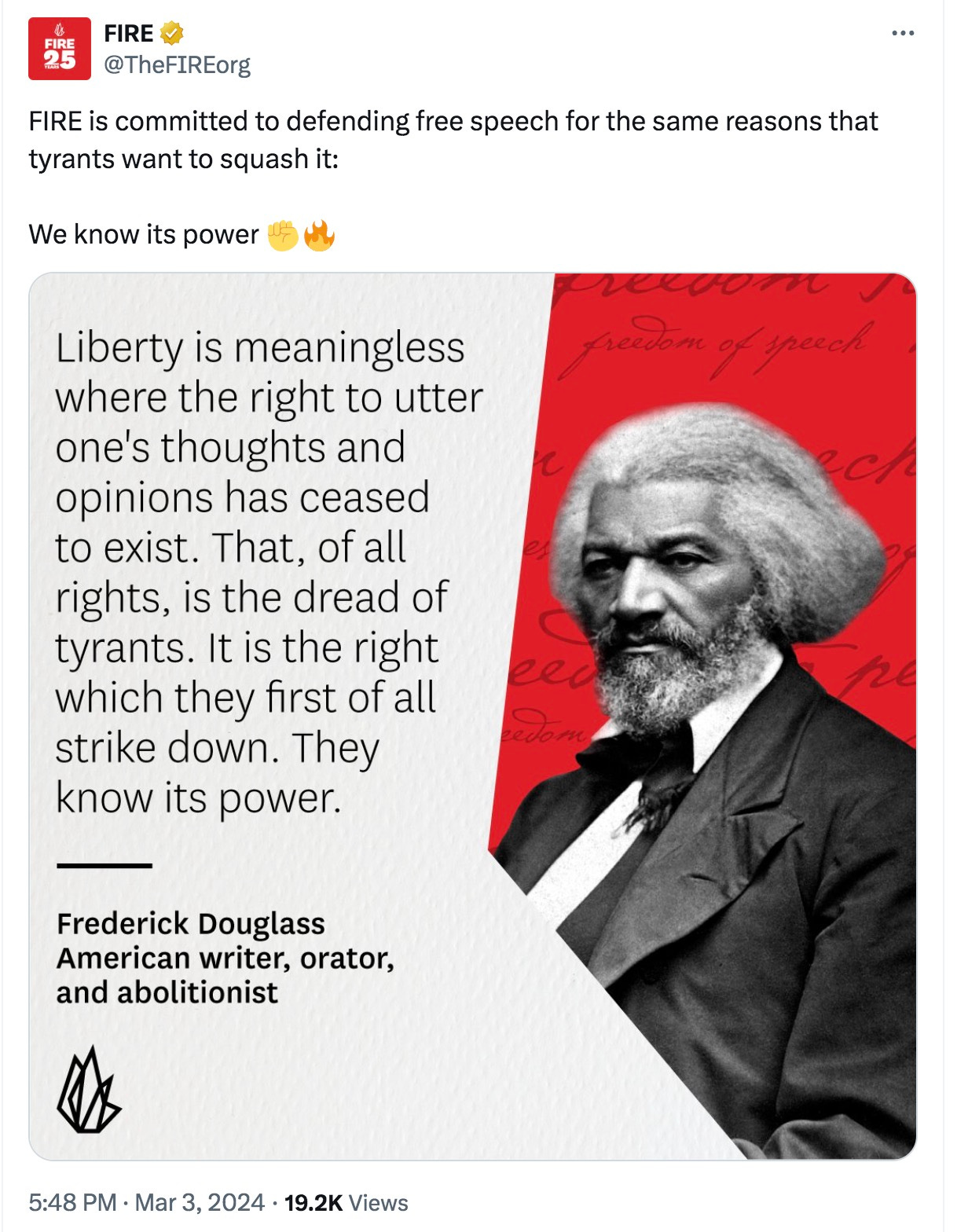E-Pluribus | March 5, 2024
Dying on a chicken sandwich hill; equity grading flunks out; and what does secular repentance look like?
A round-up of the latest and best musings on the rise of illiberalism in the public discourse:
Jonathan Chait: The ‘Fake’ New York Times Chicken-Sandwich Story Turns Out to Be Quite Real
Sometimes it’s good to be skeptical of personal anecdotes (see Jussie Smollett). But the response of many progressives to Adam Rubenstein’s recent story about his New York Times experience has frustrated Jonathan Chait. The New York Magazine contributor, no conservative himself, says the left does itself no favors with knee-jerk disbelief to anything embarrassing and discrediting that, at times, just happens to be true.
[Adam] Rubenstein repeated a story about an orientation event in which he named his favorite sandwich, from Chick-fil-A, only to be rebuked by an HR representative, “We don’t do that here. They hate gay people,” a comment met with snaps of approval by others in the room.
On social media, various left-wing journalists asserted immediately this episode was a fabrication. “Never happened,” wrote New York Times Magazine writer and journalism professor Nikole Hannah-Jones. “Is anyone going to contact the Atlantic to ask them about the process behind publishing this egregiously fake anecdote,” pleaded left-wing podcaster Michael Hobbes.
[. . .]
Numerous acquaintances of Rubenstein (one of whom communicated with me) have affirmed that he told this story contemporaneously. Washington Post media reporter Erik Wemple reports, “According to several sources, Rubenstein’s encounter with the HR official itself became an HR issue in the weeks following the incident. Rubenstein told some colleagues about it, including longtime columnist David Brooks, who was his supervisor.”
It’s not irresponsible to question the veracity of a factual claim in the media, even one in a fact-checked publication like the Atlantic. Sometimes fact-checkers get fooled. What’s striking about this episode is that professional journalists stated without qualification that the incident was not merely dubious but definitively and obviously untrue.
[. . .]
There is a lively strain of left-wing media criticism that almost monotonously attacks any mainstream organ that publishes any story that creates discomfort for the political left. Hobbes has attracted an influential following by leveling these critiques. He insisted Jamie Reed’s whistleblower account of her work at a youth gender clinic in St. Louis was the fabricated claims of a front-desk staffer, when Reed’s main claims (including her involvement in patient care) were later confirmed by a Times reporter. He scolded reporters for writing about public concern about President Biden’s age, insisting, “If people have a meritless concern, journalists’ job is to tell them it’s meritless.”
There is a ravenous appetite for a strain of media criticism that relentlessly dumps on any reporting that casts the left in a negative light. Of course, some of those criticisms are valid — I’ve made many of them myself. But the criticism has been a tactic so common it has a name, “working the refs.” Many of these critics take advantage of the high standards of truth aspired to by mainstream media to nitpick their reporting. But episodes like chicken-sandwich-gate clarify what’s actually going on. These critics don’t care what’s true. They only care about what’s useful.
Read it all here.
Daniel Buck: ‘Equity Grading’ Deserves a Failing Grade
The self-esteem train has been chugging down the public education tracks for a few decades now. One stop along the way was equity grading. At National Review, former teacher Daniel Buck refuses to score equity grading on a curve and gives it a solid “F.”
Throughout the past decade, bestselling books have advanced an ill-begotten theme called “equity grading,” arguing that it’s traumatizing to assign failing grades or unfair to accept only written math problems instead of diagrams, spoken word poems, or plays about it. As early as 2013, entire states such as Oregon experimented with these theories, nixing penalties for late assignments and grades for homework.
The pandemic then provided justification for an overhaul of grading practices, normalizing what had been expert musings and scattered experiments; schools across the land relaxed grading standards and graduation requirements. Should a student receive a permanent blemish on their record because they struggled to learn pre-calculus via Zoom?
Unfortunately, these temporary policies are proving permanent — gaining momentum even. Districts from Las Vegas to Portland, in states from Virginia to Connecticut have dropped grades for homework, removed penalties for late work or cheating, and further adjusted grading scales toward leniency. One popular policy requires teachers to give students at least half-credit even if they turn in no work.
[. . .]
The folly of such policies is borne out by solid research. A policy brief from my Fordham Institute colleagues Adam Tyner and Meredith Coffey collects this research and explains the dangers of policies that lower academic standards and expectations. For example, they cite a 2020 study showing that students assigned to “teachers who graded more strictly” indeed went on to show “greater test score growth.” They also cite a study of college students where “students who expected a ‘C’ in their class studied about 50 percent more than students who expected an ‘A.’”
[. . .]
One need not belong to the “intelligentsia” to make out how things work in practice: Remove the consequences for not turning in top-notch schoolwork on time, and kids will slack off. If one can submit only a few incomplete assignments late and still pass, why not skip homework club? Adolescents might be rebellious by nature, but they’re not idiots.
[. . . ]
In classrooms, you get what you tolerate and what you demand. If schools tolerate missing assignments, shoddy work, unlimited retakes, cheating, and late submissions, that is precisely what they’ll get. “No ordinary man” would be surprised.
Read it all.
Marilyn Simon: On Sin and Repentance
As society continues to secularize in the age of social media, we see a lot of public apologies. But how does that compare to actual repentance and forgiveness for wrongdoing? At Quillette, Marilyn Simon contrasts secular ideas of sin and sorrow and confession with those of Christianity and finds the former wanting.
Christianity runs against the therapeutic values of contemporary culture. Rather than encourage the individual to affirm one’s inner world, Christianity asks that we acknowledge our manifold shortcomings. Rather than demand that others validate and celebrate your inner self, Christianity asks that you repent. It might seem that the Christian would feel burdened by her own unworthiness—crushed by guilt and fall into despair, which is the final form of the sin of pride. There always is a danger of this happening.
[. . .]
The strange (I should maybe say miraculous) thing is that Christianity—in particular, knowing of and repenting for my sins—gives me a feeling of inner integrity and strength. It gives me agency, that much sought-after quality of modern life. Selfishness and moral failures confer dignity upon the individual. Being a sinner makes me see that I am not a victim. It makes me self-sovereign, gives me a real understanding that I am not a mere passenger in my life. The sinner is not a dupe of fate. Who is to blame for my moral failures of ingratitude, pride, and resentment? I am. Who is at fault for my self-deluding excuses? I am. Who hurts because of my own sinfulness? I do and so do others. Guilt is good. I have much to feel guilty for and ashamed of. Forty days doesn’t seem like nearly enough time. (Relative to my depravity, the Church is merciful even in Lent’s brevity.)
Despite statistics to the contrary, modern society is a religious culture. People who are religious have a keen sense of this, but many secular people have become aware of it too. We live in a society preoccupied by sin, though our secular faith has a different emphasis than that of Christianity’s focus on the shadowy corners of the human heart. One can hardly move through public spaces without being confronted by the sins of the nation and its past. The sins of systemic racism and settler colonialism. Of heteronormativity. Of unconscious biases. Of capitalism. Of privilege. Some of these sins are real. All of them now require some kind of public confession and secular liturgy.
[. . .]
In our secular faith, we are encouraged to discover our own hidden sins; in order to be a good person we must find them. We must feel the appropriate guilt for our culture, our privilege, our history, so that we may publicly confess it. Guilt and confession complete the circle of moral absolution, but it is a continuous cycle that requires constant self-discovery and self-flagellation. In effect, this creates an exclusionary secular faith for the privileged class. Any combination of white, male, middle-class, educated, and heteronormative grants you access to the secular church body.
We pray both to and against the institutions that have caused us to feel this guilt, and both to and against those who suffer at the hands of our culture’s institutions. Our civilization’s institutions have created systemic injustices, but we look to these institutions—schools, universities, public services, and corporate culture—to grant us absolution through our guilt and confession. We give these institutions power. They must have power in order for our guilt to be sustained. At the same time, they are the places where we make these confessions, so they must have the power to hear them. We give moral authority to the institutions that both cause and vindicate our sins. What could possibly go wrong?
Read the whole thing.
Around Twitter (X)
Michael Shellenberger has obtained internal messages & discussions from the World Professional Association for Transgender Health (WPATH) that expose the dangerous, unscientific practices and motivations behind the pediatric transgender movement:
Does the First Amendment go “too far”? Emma Camp is appalled at the findings of a recent survey:
And finally, it’s always a good day to hear from Frederick Douglas:










